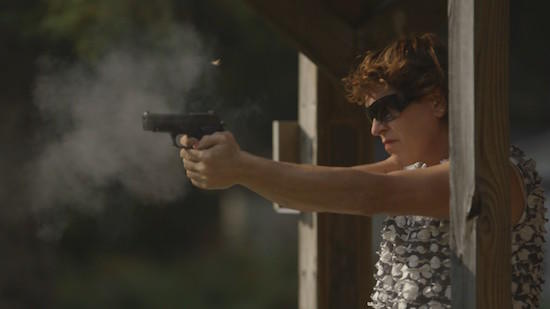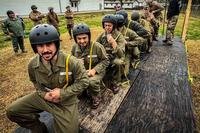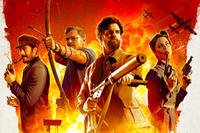
Lady Valor is a documentary film about Kristin Beck, a former Navy SEAL who came out as a transgendered woman on Anderson Cooper's CNN program in 2013. The network then commissioned this film, aired it last month and now it's available on VOD and DVD from Wolfe Video. Kristin Beck comes off as exactly the sort of badass you'd expect a special ops warrior to be. Over the course of an interview about her Navy career as Christopher Beck, she calmly describes her resumé and it's spectacular.
The movie is aimed at everyone who's not predisposed to understand or accept Kristin Beck's transformation and highlights the role the United States Military has historically played in changing mainstream America's attitudes about race, religion, national origin and sexuality. Beck thinks transgendered Americans can and will serve their country as well as anyone else.
%embed1%
Here's a challenge to those of you who already already cracking your knuckles to furiously type your outraged comments below: take the time to read through the interview (it's a long one, maybe the longest one we've ever published) and think about what Kristin Beck has to say. It's a different perspective on what makes a true warrior from someone who definitely qualifies as one.

So let's talk about your life as a SEAL: your background, why you decided to join the military, and your experiences during your service.
Well, I guess I would go back to actually growing up. I grew up on a farm with horses and all that and I learned a real hardcore work ethic. Even in grade school I remember going out to the barn and taking care of the horses. I was not the biggest kid and all of this was part of me, being transgender pretty much my whole life, so I was growing up as kind of an underdog. I was growing up as one of the disenfranchised, though most of it was internalized but I always had that thought that I was a defender.
Whenever I saw anybody being bullied or I saw something that was not right, I would always try to defend everyone. I found myself in a lot of fights as a youngster from defending other people or just defending myself. Even throughout high school, I was standing on the outside looking at everybody else and on the edges of life. That was where I put myself. So I would only intervene when I saw it necessary that I had to do something. When I was growing up, my mother, I'd come home with a black eye and I'd tell her what happened. She said I always had this skewed sense of justice, that I was always having to jump in the middle of it or was always a little overboard with it.

(That's Christopher Beck on the left with the mustache.)
When Desert Storm started up back in 1990-91, I was just recently out of college at Virginia Military Institute. I had to join. When you have a call to duty and the military needs you, you know as an American or as a wannabe patriot, it's time. I said I had to join up, so I joined. And I joined with the specific intent to become a Navy SEAL.
Immediately after boot camp went into Navy SEAL training in BUD/S Class 179 and graduated at the top of my class. I had my choice of duty stations, because that’s what you get when you're at the top of the class, so I chose SEAL Team 1. It was a pretty amazing team, going back to the legacy of Vietnam and the things that they did. They’re very disciplined and pretty hardcore. When I went to that SEAL team, I rose to the top of the SEAL team. You know, getting my choice of assignments and being deployed numerous times.
When Bosnia broke out in the mid-90’s, I was chosen to go to Bosnia as one of the representatives of the SEAL teams. That was mostly a Special Forces mission. It was a Green Beret mission. And they were accepting just a few SEALs, and I was one of the ones they sent over.
After 9/11, I was picked for a couple of special assignments and then I went to do some work with a few of the agencies, the OGA's, as we call them, Other Government Agencies. I kept advancing and being picked to do some special assignments. And so after that special assignment I was requested to go to a DEVGRU for some of my skills as a UAV pilot to do special reconnaissance.
After that, I was picked to do source operations and became a case officer and working with some of the insurgents and guerillas on the border of Afghanistan and Pakistan, working with Mujahideen and tribal chieftains. I was just working as hard as I could.
I had a beard that was almost to my waist and working deep within the tribes in Afghanistan. I did that for a few years. I was getting close to 20 years and I knew I couldn’t be kicking in doors and working with the tribes my whole life, so I stepped out of that and my last assignment was a request to go to special operations command.
At the time, it was Admiral Olson, the four star, and the Science and Technology Director was an astronaut, Bill Shepherd. Bill Shepherd requested me by name to go be his senior enlisted advisor. So I went to Science and Technology for my final tour and I started a few programs from scratch.

I was given no money and no people and just had to do it on my own. One of those projects I started in 2009-2010 is still running strong today in Afghanistan and other places around the world. I think the project now is something like a $60 million dollar project and it employs 50 or 60 people. It's gonna turn into a pretty huge project. I started that with Bill Shepherd. It was me alone and no money. And that was what I was good at. I'm good at doing the innovation. I'm good at inventing. I'm good at problem solving. You know, “Here's the problem and we're not going to give you anything. You have no tools, no nothing to do it.” And then I scrape it, scrape up the tools and I get the people and work on starting from scratch. So that’s kind of what my expertise really lies is being an innovator.
After I retired, I started working for the Pentagon with the Director of Research and Engineering and started a few more projects for the Department of Defense and most of those are still classified. It's been quite a wild ride.
I mean everybody is handed a pile of scrap. And that was pretty much like my life. I had been handed a whole bunch of piles of scrap and I take those piles of scrap and I don’t complain, work hard, and try to take what I’m given and do the best I can. I've done that with pretty much every job.
If people see that I'm taking this big pile of junk, that I’m turning it into something gold, they say, “Wow, you did pretty good with that. Here's another pile” or “Here's something a little bit better.” And so doors open only because I try not to complain and I work hard and I do my best. About 90 percent of the time, it turns out really good. I have that 10 percent of that time where it kind of screws up and I think it happens to everybody. But it's just been a wild ride and I've done the best I could.

So you got your full 20 in before retirement.
I'm 90 percent disabled, though. I've got a lot of injuries. For me, waking up in the morning is a struggle just to go. It takes me about an hour with my cup of coffee and loosening up and stretching and trying to get into the point that I can even walk sometimes. So I've definitely beaten myself up.
I've been on a lot of missions. I have a Purple Heart. There was a rocket attack and some mortar attacks that I took a lot of frag. And there's some other things that happened. I was on a ship back in the 90's and we were in pretty big seas with like 5, 6 foot waves hitting the boat pretty hard. I fell off a ladder from about 18 feet up and I landed on the boat down below and I broke a few vertebrae in my back.
When I was in Bosnia, I blew my shoulder out and so I've gotten some operations on that. I fell through a roof in Afghanistan and I broke some ribs when I fell into the room down below.
I definitely paid the consequences. I'm 48 years old, but I think that my body feels like I'm probably 80. You know it's just real hard to walk sometimes.

From your experience, did the SEALs you served with make their 20?
If I was to guess, it's probably maybe 40 percent, maybe 30 percent. So let's say 30 to 40 percent probably make it to 20. There are a lot of SEALs that get out after 4 years, some of them make it to the 10 year mark, but it's an abusive career. I mean you're beating yourself up and it's mentally exhausting. It's physically very exhausting.
I find that on the outside guys are being offered six-figure jobs. Any big company out there, any Fortune 500 company or any other company, when you bring in a SEAL team guy, you're gonna have somebody who has an immense amount of experience in problem-solving and a real go-getter attitude. You want an 8 hour day? Well, that SEAL is going to give you 12 or 14 hours as a normal work ethic. Because we're such small teams, there's so much expected of every single individual SEAL on a team. When they go to a bigger company, they apply that same thing. I've seen it time and time again.
Ryan Zinke is a new congressman from Montana and he's going to do some amazing things in that state. I'm just so proud of Congressman Zinke now. He was a great commander when he was in the SEALs and I know that he's gonna do the same thing for the state. He's also one of the SEAL team guys that sees what I'm doing right now and sees that I'm still fighting for justice for a whole group of people who are totally disenfranchised. If you think about a military person, someone like us that really put in their time, we fight for justice, we fight for liberty, we fight for freedom and equality, we fight for the Bill of Rights.

There are huge debates about the Bill of Rights from our forefathers. You read in some of those debates and read the transcripts about what was going on back in those days and learn that the reason the Bill of Rights wasn’t put in directly into the Constitution was because they knew that they didn’t know everything. They delineate every little thing in the Bill of Rights and put it into the Constitution to make it law. They knew that they’d probably forgotten some stuff.
So in order not to forget things, in order not to tell the future generations that this is exactly what you shall defend, well, we want to make it a little more open-ended. We want you to understand the Constitution just frames the guidelines and then the Bill of Rights, we want everyone to be treated equally, but we can't say delineate it down to color, race, religion, and all of the other things and write down every little thing because things are gonna happen in the society that we don’t know yet.
The forefathers were so much smarter than we are nowadays. I don’t know what I need to defend 20 years from right now, because things are going to change and we're gonna grow as human beings and things are gonna happen.

If I tell you right now that this is what America looks like, well, ten years from now that might not be the same. I need to grow with society and I also need to grow as a human being and America needs to grow. We can't be stuck in 1800 or 1700 verbiage. We can't be stuck with things that were given to us and handed down from our forefathers and still say this is the letter of the law, because that letter of the law is guideline and it's encompassed in a way that if we don’t grow, then we're gonna become obsolete.
I'd love to see the politicians speaking to each other. When they're up there, you guys need to come across the aisles a lot more. These partisan politics that are going on right now, it's just total crap. And the America that I live in right now is going to be a whole different America in five years, in ten years, and they need to open up their minds and understand that if you're a 65 or 70 year old Congressman that’s been there for 30 years and you're still basing all of your decisions upon how things were when you were a 20 year old, well, you're not right. You're not voting for the America that I live in today.
If I was a Congressperson and I was sitting up there making these decisions and I was basing it solely on my own experiences, well, I would probably be wrong. I should be basing my decisions on what's happening with the constituents. I need to base it on what's happening in the future generations and trying to write the law and try to be the proper representative for an America in four or five years in the distant future. I know that Congressman Zinke is gonna do that, because I know he's already done it.
He said that he sees what I'm doing. I'm fighting for justice for a group of people that never had it. In the LGBT community, we're still disenfranchised. We're still underpaid. We get fired and we suffer prejudice and there's bigotry. I also see it amongst African Americans that I speak to every day. They are still having problems with equality and with jobs and the workforce and in education. There are still a lot of things in America that we need to learn and we need to fight for. I'm a Navy SEAL, I always will be, and I'm fighting for all those people in America, just like I was in the SEALs. I'm fighting for equality, I'm fighting for liberty, I'm fighting for freedom and justice. We don’t have it in America. It's not equal across the boards. Not everyone gets a fair shake. I want everyone in America to get a fair shake. That’s my mission.

Do you think that the military is sometimes better equipped to deal with issues of equality and race and gender than civilians are back home? That the military seems to have less problem with it than mainstream America?
I think most of the time the military always had less of a problem with that. If you go back to the Civil War, there were all kinds of African-Americans fighting on both sides, but then you go to World War II. There was some amazing service done by all races, all creeds, and different religions.
Go to the OSS, the precursors to the CIA. I was just at a huge dinner with the OSS and Leon Panetta was given the biggest award and it was amazing. I was sitting at the table with spymasters and directors of the CIA from the last 20 years. They were talking to me and they were nodding their head and said, “OK, we get it. We understand what you're doing.” This is what we were doing during World War II. We are fighting bigotry; we were fighting prejudice. We understood that Hitler and the Nazis were immense bigots against huge groups of people and we can't do that.
In America, it's fighting the right fight. We were trying to fight that around the world and sometimes we mess up. As a military, there's definitely problems, but for the most part we do a pretty damn good job, you know? I think that we need to open up our eyes and understand that the military, we've had our problems, but we really try hard. When the bosses, and that goes to the President of the United States and it goes to the Secretary of Defense and all of the other leaders, when the chain of command says do this, we dang well do it.
We work hard to implement everything we're told to do and it's happening right now. The repeal of Don’t Ask Don’t Tell has made gay and lesbian service within the military totally legal. And it rightfully should have been because there are a lot of people that can bring some amazing good things to the military that we've always needed.
There are still some problems. They're still some people who begrudgingly accept it and in the background there is still some prejudice and bigotry. There's also bullying. But I think the military overall does a pretty darn good job and we are the leaders and society can look at us and say that, “Well, if they can do it, then we can do it.”
The military is made up of green. We're dark green, we’re light green, we’re same sex marriage green, we're heterosexual marriage and Christian and Islam. It's all different colors of green. Because, when you get right down to it, when the bullets start flying, I'm gonna defend my brother. I'm gonna defend what I have to defend. And no matter what color, no matter what religion, no matter what orientation, and no matter what gender, if they're there on my side and you're one of my green soldiers, I'm gonna defend you as much as I can and defend the Constitution and defend America.

How did the film happen? Talk about the DVD.
The film happened because I went on Anderson Cooper and they figured out that I wasn’t just a knuckle-dragging Navy SEAL like some people think we are. You'd be surprised that most Navy SEALs have college degrees and most of us read a lot. We really try hard. We're kind of like the philosopher warriors, if you want to put it that way. We're very introspective and we really study what's going on because we have to be super independent. You can't be independent without some knowledge. You'll find that just about every Navy SEAL you talk to will surprise you.
I think I surprised CNN and then CNN said they wanted to bring this along further. We want to do something. I said, “I will do this with you, but I'll only do it on one condition. This film will be educational. It's not gonna be made for the choir. It's not made for LGBT groups. It's not made for the gay and lesbian crowd. I want this film to be made for everyone else. I want it to be made for the military. The people that don’t even know what gay is or have never met anybody who was gay, or they don’t know what transgender is. This film is going to be for everybody else.”
If you watch the film, you'll notice that there's a bunch of guns or some dogs or some beer drinking in pretty much every scene. This film was made for everybody else to show that, “Hey, I'm just a normal human being and I have my own ways to do things. I might be a little different, but you know, I'm a human and I'm a little bit of a redneck and I grew up in a farm and that’s okay.”

I just try to live my life. If you don’t like it, then I don’t really mind that much. It's okay.
This film is trying to be educational to everybody that normally wouldn’t watch a film like this. Watch it with an open heart. Open up your mind a little bit and just see someone who is a little bit different than you. Check out what they're up to because it's not that much different than what you do every day. I'm just living my life and trying to live life, liberty, and the pursuit of happiness. Just trying to be a good person.
I meet with people in the Pentagon pretty much weekly and that’s what my job is right now. I have no living. All I'm doing is activism. I'm trying to follow up from the film. Just about a week and a half ago, I had a meeting with the Assistant Secretary of Defense and Health Affairs who said, “We are listening.”
They are listening and I'm working with them every day. The Department of Defense truly wants to represent America. I'm an American and I can serve. I am worthy. They want to represent and to man and equip and be ready to defend America foreign and domestic. If it takes someone like me to let them know that a transgender person can and is willing to serve in the defense of our Constitution, then I can do that. They understand that this is in their best interest and they are listening.




